Production Year 2015
Trace of the History of Ise Gran-Shrine: Treasures of the Land of the Rising Sun
DC271535![]()
時を紡いで~美し国の宝~ [MTV]
![]()
![]()
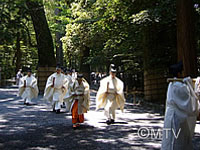
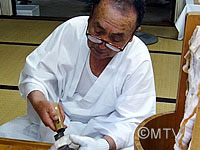
|Length : 46min |Year : 2015 |
Ise Gran-Shrine in Ise City, Mie prefecture, is thought to be the spiritual home for Japanese, and has been the center of Shinto for more than 1000 years. In 2010, more than 8.6 million people including the young and foreigners visited the shrine, which is the highest number in a century.
Shikinen Sengu is the most important ritual, which is held once every 20 years. It involves the reconstruction of the buildings, as well as renewal of the sacred apparel and the treasures carried to the new sanctuary. Sacred apparel and treasures associated with the deities are offered to the shrine at Sengu held every 20 years from 1300 years ago.
Moreover, local residents who live on the land that once belonged to the shrine have kept working for the shrine by making salt or weaving. This program also introduces the local people’s sincere minds for facing God.
 A Passionate Challenger | A Japanese Woman’s Hunt for the Elusive White Cacao
A Passionate Challenger | A Japanese Woman’s Hunt for the Elusive White Cacao
DC281555![]()
情熱大陸 | カカオハンター・小方真弓 [MBS]
![]()
![]()
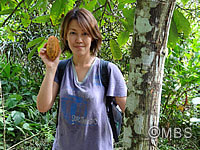
|Length : 24min |Year : 2015 |
Mayumi Ogata is a Japanese woman with an unusual profession known as "cacao hunter." She searches for cacao while keeping an eye on market trends as well as the cacao-growing industry’s future.
Ogata started out at a chocolate ingredients supplier, but she developed a keen interest in cacao itself and left the firm in 2003. Subsequently, she traveled to cacao-growing nations, researching each region's cacao industry. With the experience she has gained, she now works on improving the quality of cacao beans and trees and developing new chocolate products.
One day Ogata finds the mysterious cacao, but all she brings back is a small cutting. She reasons that by planting it and protecting the variety, it could one day provide a living to people in the area. She believes that hunters must not plunder.
 A Passionate Challenger | A Little Make-up Goes a Long Way: A Japanese Woman’s Efforts to Win Smiles
A Passionate Challenger | A Little Make-up Goes a Long Way: A Japanese Woman’s Efforts to Win Smiles
DC281556![]()
情熱大陸 | 社会企業家・向田麻衣 [MBS]
![]()
![]()
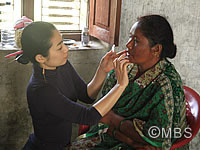
|Length : 24min |Year : 2015 |
Nepal is one of the most underprivileged nations in the world. Here, where women live in dire conditions, a lone Japanese woman strives to render aid through “facial make-up.” She is social entrepreneur Mai Mukaida.
In 2009, Mukaida began the Coffret Project which sought to bring smiles and hope to women victimized by prostitution and rape. The idea was to support these women through make-up; to instill confidence in them to get through life.
One day Mukaida journeys to an impoverished village and encounters young women who were once a type of indentured slavery. After talking to them, she gently applies make-up on them. What the camera lens captures is...
Two Home Countries: Evelyn’s Journey
DC281557![]()
母の国へ~馬瓜エブリン18歳~ [NBN]
![]()
![]()

|Length : 48min |Year : 2015 |
“What is nationality? What is race?” These are questions Evelyn Mawuli has been thinking about since she was a little girl. Born and raised in Japan to Ghanaian parents, Evelyn speaks Japanese and grew up no differently from any Japanese child in Japan. When she was in elementary school she became aware of her differences.
At age 14, Evelyn was a candidate to play for Japan’s under-16 national basketball team. In order to give Evelyn a chance to fulfill her dream, her mother made a decision to become a naturalized Japanese citizen giving up her Ghanaian nationality. With her high school graduation a few months away, she decided to visit her mother’s home country. What made her decide to visit Ghana?
Visas of Life: Japanese People who Saved 6000 Lives
DC281558![]()
私をおぼえていてください 素敵な日本人へ [FTB]
![]()
![]()
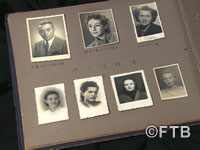
|Length : 48min |Year : 2015 |
It is said that during the Second World War, around 6 million Jewish lives in Europe were lost by the hand of Nazi Germany. However, 6000 Jewish people were saved by being able to leave Europe thanks to transit visas issued by Chiune Sugihara, who worked for the Japanese consulate in Lithuania at the time. Crossing the Soviet Union by the Trans-Siberian Railway, the Jewish refugees were able to flee by boat from Vladivostok to the harbor of Tsuruga in Japan.
Many stories that were buried in the stream of history have been kept afloat in the memories of the Sugihara survivors. It is because of their testimony that we come to think this is a precious and important part of history, and something that should never get lost.














